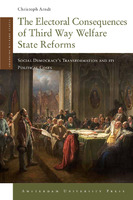The Electoral Consequences of Third Way Welfare State Reforms
Social Democracy’s Transformation and its Political Costs
| dc.contributor.author | Arndt, Christoph | |
| dc.date.accessioned | 2013-12-31 23:55:55 | |
| dc.date.accessioned | 2019-12-10 14:46:32 | |
| dc.date.accessioned | 2020-04-01T14:58:47Z | |
| dc.date.available | 2020-04-01T14:58:47Z | |
| dc.date.issued | 2013 | |
| dc.identifier | 452435 | |
| dc.identifier | OCN: 861526837 | en_US |
| dc.identifier.uri | http://library.oapen.org/handle/20.500.12657/33863 | |
| dc.description.abstract | In all advanced Western nations, policy-makers have implemented encompassing welfare state reforms in recent decades breaking with past welfare arrangements. In particular, social democracy engaged in significant policy change under the Third Way paradigm and broke with its traditional reputation on welfare that had built the ties with the core constituency in the 20th century. The Electoral Consequences of Third Way Welfare State Reforms: Social Democracy’s Transformation and its Political Costs provides a comparative study of the electoral consequences of Third Way welfare state reforms. The book demonstrates that Third Way reforms went against the social policy preferences of social democracy’s core voters and indeed produced an electoral setback for social democrats at the ballots. Moreover, and accounting for cross-national variation, the analysis shows that the nature of the setback is contingent on the electoral system and the party competition social democrats face when reforming the welfare state. | |
| dc.language | English | |
| dc.relation.ispartofseries | Changing Welfare States | |
| dc.subject.classification | thema EDItEUR::J Society and Social Sciences::JP Politics and government::JPH Political structure and processes::JPHV Political structures: democracy | en_US |
| dc.subject.other | welfare state | |
| dc.subject.other | Denmark | |
| dc.subject.other | Germany | |
| dc.subject.other | Labour economics | |
| dc.subject.other | Left Party (Sweden) | |
| dc.subject.other | Social democracy | |
| dc.subject.other | Social policy | |
| dc.subject.other | Sweden | |
| dc.title | The Electoral Consequences of Third Way Welfare State Reforms | |
| dc.title.alternative | Social Democracy’s Transformation and its Political Costs | |
| dc.type | book | |
| oapen.abstract.otherlanguage | Dit boek analyseert de electorale gevolgen van de hervormingen in de welvaartsstaat in vier liberaal sociaaldemocratische landen in Europa. Deze zogenaamde ‘Derde Weg-sociaaldemocraten’ hervormden de welvaartsstaat zodanig dat een deel van het sociaaldemocratische electoraat zich definitief van hen afkeerde. Dit is de belangrijkste conclusie van dit boek, waarvoor vergelijkend onderzoek werd verricht in Zweden, Duitsland, Denemarken en Groot-Brittannië. | |
| oapen.identifier.doi | 10.26530/OAPEN_452435 | |
| oapen.relation.isPublishedBy | dd3d1a33-0ac2-4cfe-a101-355ae1bd857a | |
| oapen.pages | 280 | |
| oapen.remark.public | Relevant Wikipedia pages: Denmark - https://en.wikipedia.org/wiki/Denmark; Germany - https://en.wikipedia.org/wiki/Germany; Labour economics - https://en.wikipedia.org/wiki/Labour_economics; Left Party (Sweden) - https://en.wikipedia.org/wiki/Left_Party_(Sweden); Social democracy - https://en.wikipedia.org/wiki/Social_democracy; Social policy - https://en.wikipedia.org/wiki/Social_policy; Sweden - https://en.wikipedia.org/wiki/Sweden; Welfare state - https://en.wikipedia.org/wiki/Welfare_state |

